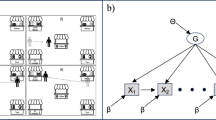Abstract
Is there such a thing as bounded rationality? I first try to make sense of the question, and then to suggest which of the disambiguated versions might have answers. We need an account of bounded rationality that takes account of detailed contingent facts about the ways in which human beings fail to perform as we might ideally want to. But we should not think in terms of rules or norms which define good responses to an individual’s limitations, but rather in terms of desiderata, situations that limited agents can hope to achieve, and corresponding virtues of achieving them. We should not take formal theories defining optimal behavior in watered-down bounded form, even though they can impose enormous computational or cognitive demands.
Similar content being viewed by others
References
Dijksterhuis A., Nordgren L.F. (2006) A theory of unconscious thought. Perspectives on Psychological Science 1: 95–109
Foley R. (1993) Working without a net. Oxford University Press, Oxford
Gardner H. (1999) Intelligence reframed. Basic Books, New York
Harman G. (1986) Change in view. MIT Press, Cambridge
Jackson F., Pargetter R. (1986) Oughts, options, and actualism. Philosophical Review 95: 233–255
Knutson B., Wimmer E., Kuhnen C.M., Winkielman P. (2008) Nucleus accumbens activation mediates the influence of reward cues on financial risk taking. Neuroreport 19(5): 509–513
Morton, A. Review of Pollock. Thinking about acting. Mind, (to appear).
Pearl J. (1984) Heuristics: Intelligent search strategies for computer problem solving. Addison-Wesley, Reading, MA
Pollock, John (2006). Thinking about acting. Oxford University Press, Oxford
Rabinowicz W. (1995) To have one’s cake and eat it too: Sequential choice and expected utility violations’. Journal of Philosophy 92: 586–620
Sternberg, R.J., Pretz , J. (eds) (2005) Cognition and intelligence: Identifying the mechanisms of the mind. Cambridge University Press, New York
Taszka T., Zielonka P. (2002) Expert judgments: Financial analysts versus weather forecasters. The Journal of Psychology and Financial Markets 3(3): 152–160
Weirich P. (2004) Realistic decision theory. Oxford University Press, Oxford
Author information
Authors and Affiliations
Corresponding author
Rights and permissions
About this article
Cite this article
Morton, A. Human bounds: rationality for our species. Synthese 176, 5–21 (2010). https://doi.org/10.1007/s11229-009-9481-4
Received:
Accepted:
Published:
Issue Date:
DOI: https://doi.org/10.1007/s11229-009-9481-4




